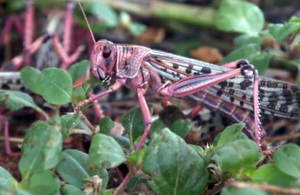Somalia including Somaliland to benefit from new UK support to tackle locusts

Somalia is set to benefit fromnew UK funding to tackle this year’s unprecedented locust outbreaks across Africa and Asia.
The UK’sInternational Development Secretary Anne-Marie Trevelyan today announced a further £18 million(Over $22 million)in response to the crisis. She made the announcementduring a visit to British company Micron Group, which supplies pesticide sprayers to the United Nation’s Food &Agriculture Organization (FAO).
Locust swarms have grown20 times larger since March 2020. In Somalia, new swarms of the desert locusts from current breeding have coincided with the start of the Gurains. The FAO predict a 15-25% decrease in the upcoming Guharvest.
The UK International Development Secretary, Anne-Marie Trevelyan, said “Vulnerable communities are on the brink of starvation because of the biggest locust outbreak in decades, made worse by the coronavirus pandemic. But unless other countries also step up and act now, this crisis will spread and cause even more devastation.”
Of the new funding announced today, £17 million(over $20 million)will go to the FAO’s emergency appeal to help to control the increase of locusts across East Africa including Somalia, Yemen and South West Asia, as well as reduce the risk of swarms spreading into the Sahel.£1million(over $1.2 million)will go towards improving early warning and forecasting systems for desert locusts, so that countries can prepare for their arrival.
The British Ambassador to Somalia, Ben Fender, said “The outbreaks of desert locusts inSomalia and Somalilandare affecting some of the most vulnerable communitiesin the country, who are already having a very difficult year as a result of floods and COVID. We are working with FAO and Somali governmentto scale up surveillance and control operations to combat the locustsand protect the harvests.”
The new funding follows £8 million ($9.8 million)provided by the UK earlier this year to the FAOlocust appeal, supporting Kenya, Somalia, Ethiopia, Sudan, South Sudan, Eritrea, Djibouti, Tanzania and Pakistan. A supercomputer funded by UK aid is also helping countries in East Africa to track locustmovements around the continent.
Since January this year, the FAO has successfully controlled over 600,000 hectares of land, saved 1.2m tons crops with a value of $372 million,and eradicated over 400 million locusts in 10 countries in East Africa.